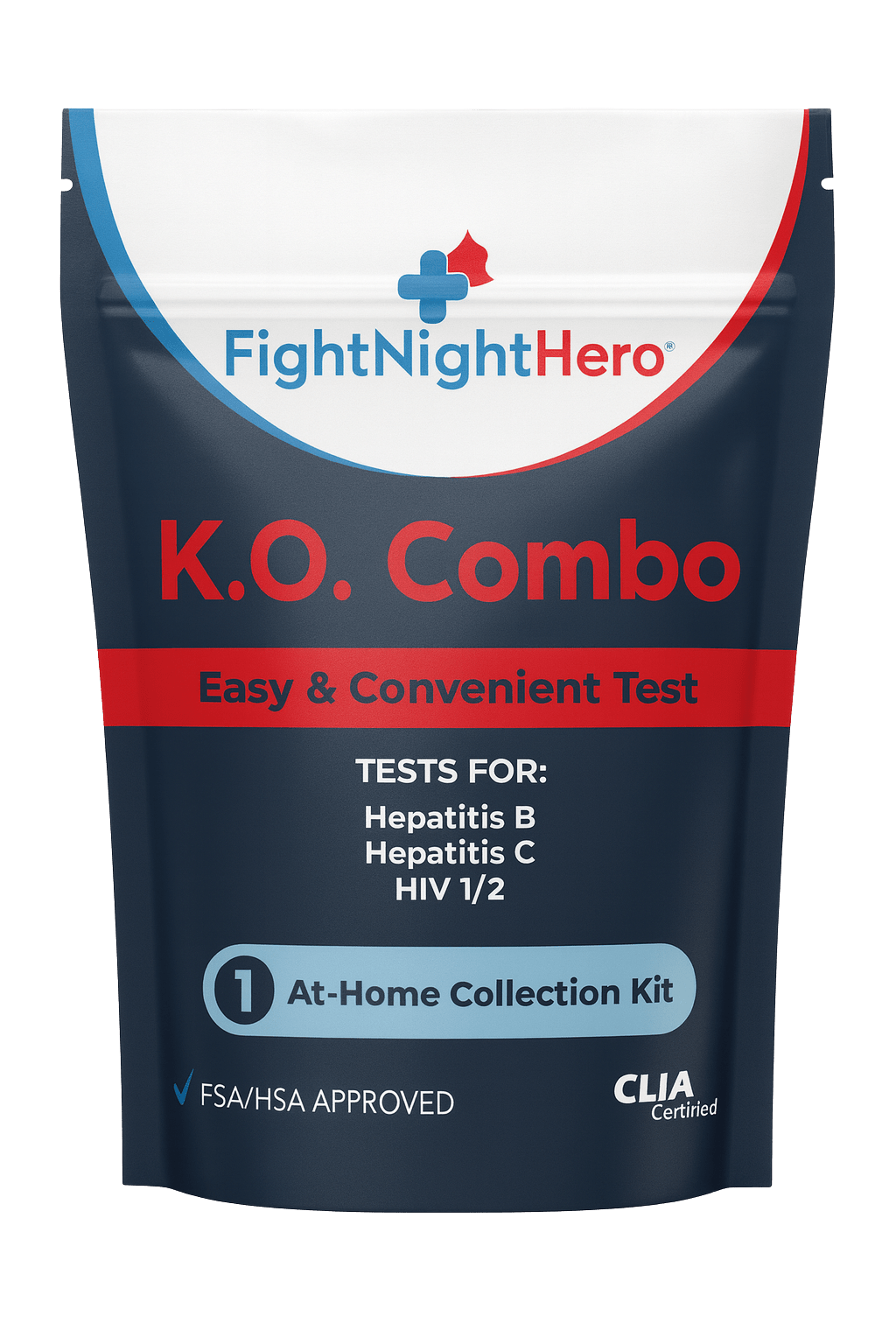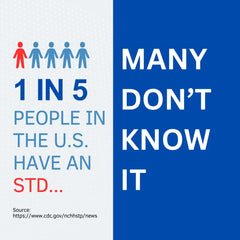
Did you know?
1 in 5 people in the US have an STI?
Source: CDC – Sexually Transmitted Infections Prevalence, Incidence, and Cost Estimates

About this Test:
The K.O. Combo by Fight Night Hero is a professional-grade at-home blood test designed specifically for fighters. It screens for key bloodborne viruses required by major organizations such as the Association of Boxing Commissions and the World Boxing Federation. This comprehensive panel includes tests for Hepatitis B Surface Antigen, Hepatitis C Antibodies, and the HIV 4th Generation Combo Antigen/Antibody. Ideal for MMA, boxing, kickboxing, and wrestling athletes, the K.O. Combo ensures you can confidently meet competition health standards from the convenience of home.
Your sample should be collected in the morning Monday – Friday and returned on the same day.
Your blood sample can be collected at any time during the day, but it is recommended to collect your sample in the morning prior to the arrival of your mail carrier.
You should be hydrated prior to the blood collection. Drink two glasses of water 30 minutes prior to testing.
Blood Kits Include:
- 1 sample tube for your blood sample
- 1 alcohol pads to keep everything clean and sterile
- 1 Tasso+ blood collection device
- 1 bandages
- 1 gauze pads
- 1 prepaid return envelope to mail your sample back to our lab
- 1 instructions for use booklets
Hepatitis B
Hepatitis B is a liver infection caused by the hepatitis B virus. The testing offered by Better Life Science looks for the hepatitis B surface antigen (HBsAg). This can be found in high levels during acute or chronic hepatitis B infection. HBsAg usually means that the person is infectious. In some cases it can also be found within 30 days after hepatitis B vaccination.
Hepatitis C
Hepatitis C is a liver infection caused by the hepatitis C virus (HCV) and is primarily transmitted through blood-to-blood contact. It can be either acute (short-term) or chronic (lifelong), with many people showing no symptoms or having mild symptoms initially. Untreated, chronic hepatitis C can lead to serious complications like liver scarring (cirrhosis), liver failure, and liver cancer.
HIV 1/2
HIV, or human immunodeficiency virus, is a virus that attacks the body’s immune system and can lead to AIDS (acquired immunodeficiency syndrome). This test screens for HIV 1/2 antibody as well as the HIV-1 p24 antigen.
Hepatitis B
Acute infection symptoms (can appear 1–4 months after exposure):
- Fatigue and weakness
- Loss of appetite
- Nausea and vomiting
- Abdominal pain (especially near the liver)
- Dark urine
- Clay-colored stool
- Joint pain
- Jaundice (yellowing of the skin or eyes)
- Mild fever
Chronic infection:
- Often asymptomatic for years
- May show ongoing fatigue, mild abdominal pain, or elevated liver enzymes
- Long-term risk: cirrhosis, liver failure, and liver cancer
Hepatitis C
Acute phase (within 2–12 weeks after exposure):
- Often no symptoms
- When present: fatigue, nausea, fever, joint pain, dark urine, light-colored stool, jaundice
Chronic phase:
- Frequently asymptomatic for decades
- Possible ongoing fatigue, depression, or right-upper-quadrant discomfort
- Over time: cirrhosis, liver failure, or hepatocellular carcinoma
HIV (Human Immunodeficiency Virus)
Acute HIV infection (2–4 weeks after exposure):
- Fever and chills
- Fatigue
- Rash (often generalized)
- Sore throat
- Swollen lymph nodes
- Muscle and joint aches
- Night sweats
Chronic HIV infection (as virus persists):
- Often no obvious symptoms for years
- Ongoing swollen lymph nodes, weight loss, recurrent fevers, or infections
Advanced HIV / AIDS stage:
- Marked immune suppression
- Frequent severe infections (opportunistic infections)
- Significant weight loss
- Chronic diarrhea
- Neurologic symptoms or cancers (Kaposi’s sarcoma, lymphoma, etc.)
You should consider getting tested if:
- You become sexually active
- You have had unprotected sex
- You are experiencing symptoms of a sexually transmitted infection
- You are entering into a new sexual relationship
- You have received a notification from a previous partner that they are infected
If you are experiencing symptoms, have been informed by a partner that they have a sexually transmitted infection, or if you have any concerns, you should follow up with a healthcare provider.
About this Test:
The K.O. Combo by Fight Night Hero is a professional-grade at-home blood test designed specifically for fighters. It screens for key bloodborne viruses required by major organizations such as the Association of Boxing Commissions and the World Boxing Federation. This comprehensive panel includes tests for Hepatitis B Surface Antigen, Hepatitis C Antibodies, and the HIV 4th Generation Combo Antigen/Antibody. Ideal for MMA, boxing, kickboxing, and wrestling athletes, the K.O. Combo ensures you can confidently meet competition health standards from the convenience of home.
Your sample should be collected in the morning Monday – Friday and returned on the same day.
Your blood sample can be collected at any time during the day, but it is recommended to collect your sample in the morning prior to the arrival of your mail carrier.
You should be hydrated prior to the blood collection. Drink two glasses of water 30 minutes prior to testing.
Blood Kits Include:
- 1 sample tube for your blood sample
- 1 alcohol pads to keep everything clean and sterile
- 1 Tasso+ blood collection device
- 1 bandages
- 1 gauze pads
- 1 prepaid return envelope to mail your sample back to our lab
- 1 instructions for use booklets
Hepatitis B
Hepatitis B is a liver infection caused by the hepatitis B virus. The testing offered by Better Life Science looks for the hepatitis B surface antigen (HBsAg). This can be found in high levels during acute or chronic hepatitis B infection. HBsAg usually means that the person is infectious. In some cases it can also be found within 30 days after hepatitis B vaccination.
Hepatitis C
Hepatitis C is a liver infection caused by the hepatitis C virus (HCV) and is primarily transmitted through blood-to-blood contact. It can be either acute (short-term) or chronic (lifelong), with many people showing no symptoms or having mild symptoms initially. Untreated, chronic hepatitis C can lead to serious complications like liver scarring (cirrhosis), liver failure, and liver cancer.
HIV 1/2
HIV, or human immunodeficiency virus, is a virus that attacks the body’s immune system and can lead to AIDS (acquired immunodeficiency syndrome). This test screens for HIV 1/2 antibody as well as the HIV-1 p24 antigen.
Hepatitis B
Acute infection symptoms (can appear 1–4 months after exposure):
- Fatigue and weakness
- Loss of appetite
- Nausea and vomiting
- Abdominal pain (especially near the liver)
- Dark urine
- Clay-colored stool
- Joint pain
- Jaundice (yellowing of the skin or eyes)
- Mild fever
Chronic infection:
- Often asymptomatic for years
- May show ongoing fatigue, mild abdominal pain, or elevated liver enzymes
- Long-term risk: cirrhosis, liver failure, and liver cancer
Hepatitis C
Acute phase (within 2–12 weeks after exposure):
- Often no symptoms
- When present: fatigue, nausea, fever, joint pain, dark urine, light-colored stool, jaundice
Chronic phase:
- Frequently asymptomatic for decades
- Possible ongoing fatigue, depression, or right-upper-quadrant discomfort
- Over time: cirrhosis, liver failure, or hepatocellular carcinoma
HIV (Human Immunodeficiency Virus)
Acute HIV infection (2–4 weeks after exposure):
- Fever and chills
- Fatigue
- Rash (often generalized)
- Sore throat
- Swollen lymph nodes
- Muscle and joint aches
- Night sweats
Chronic HIV infection (as virus persists):
- Often no obvious symptoms for years
- Ongoing swollen lymph nodes, weight loss, recurrent fevers, or infections
Advanced HIV / AIDS stage:
- Marked immune suppression
- Frequent severe infections (opportunistic infections)
- Significant weight loss
- Chronic diarrhea
- Neurologic symptoms or cancers (Kaposi’s sarcoma, lymphoma, etc.)
You should consider getting tested if:
- You become sexually active
- You have had unprotected sex
- You are experiencing symptoms of a sexually transmitted infection
- You are entering into a new sexual relationship
- You have received a notification from a previous partner that they are infected
If you are experiencing symptoms, have been informed by a partner that they have a sexually transmitted infection, or if you have any concerns, you should follow up with a healthcare provider.


 Description
Description
